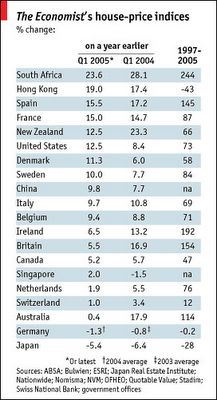The Economist is also fretting about housing (as it has been for some time now).
One other big difference between houses and shares is more cause for concern than comfort: people are much more likely to borrow to buy a house than to buy shares. In most countries, the recent surge in house prices has gone hand-in-hand with a much larger jump in household debt than in previous booms. Not only are new buyers taking out bigger mortgages, but existing owners have increased their mortgages to turn capital gains into cash which they can spend. As a result of such borrowing, housing booms tend to be more dangerous than stockmarket bubbles, and are often followed by periods of prolonged economic weakness. A study by the IMF found that output losses after house-price busts in rich countries have, on average, been twice as large as those after stockmarket crashes, and usually result in a recession.
The Economist also publishes a global house price index, here is the latest version.

Apart from the fact that the boom in the Netherlands, the UK and Australia has now clearly broken, note the performance in key ageing economies like Germany and Japan, where property values have been falling for some time now, and Switzerland, where they are about to. One other surprising detail is Italy, where y-o-y is still at 9.7% despite the protracted recession. Just watch what happens when it follows the 'ageing' trajectory. (Spain will too, in my opinion, but that is out there in the future , and another story).










